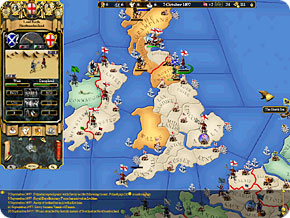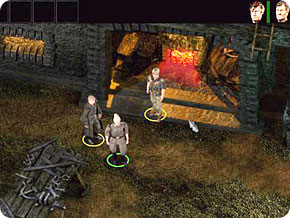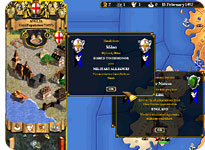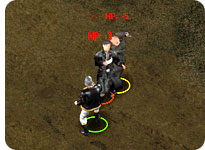Europa Universalis II and Another War
Those that do not learn from history are doomed to repeat it. But learning doesn’t need to mean listening to a professor’s monotone voice repeating tired lectures. Virtual Programming’s Europa Universalis II and Another War offer macro and micro views of history that are both engaging and entertaining, as well as edifying.
Europa Universalis II takes the big picture view. Covering the years 1492 to 1792, the game puts you in charge of a fledgling nation that you try to lead to world superpower. You build your military and economy, colonize unclaimed territories, send explorers to bring back news of the New World, and engage in diplomacy with other nations. Along the way, you may meet such real-life leaders as Napoleon and Genghis Khan.
You can select from one of nine different scenarios, including: the Grand Campaign, which lasts the full 300 years; American Dream, in which you guide the United States through the Revolutionary War; and the Age of Exploration, where you establish colonies in the late 1400s. Each scenario features a variety of side missions you can undertake to secure extra victory points as well as real historical events that affect the balance of the game.
Winning the game doesn’t necessarily require conquering the globe. Before you begin playing, you can choose one of four conditions for victory: standard (the nation with the most victory points at the end of the scenario wins); supremacy (first to a preset amount of victory points); deathmatch (the first to conquer a preset number of provinces); and mission (the nation that succeeds in its scenario mission first wins).
While a high-level view is vital to your success in Europa Universalis II, you also need to keep your leaders in mind while you play. For example, your fledgling empire’s ruler has certain abilities that should inform your decisions, and your armies are led by commanders whose skills you need to keep in mind before going to war.
An RPG of a Different Type
Another War showcases one of the many private battles fought against the massive backdrop of World War II. In this drama, you play a privateer stuck in Nazi-occupied France. When a friend of yours gets in over his head with some business dealings, you feel obligated to help him out. The only problem is that you’re hopelessly outnumbered by Wehrmacht troops and you have no weapons.
But heroes perform their best when the odds are heavily stacked against them, and you decide, of course, to help your friend out. Soon you’re pulled into a web of intrigue that takes you from a small French village to Leningrad and the bowels of a secret research project that could doom the Allies’ cause. Along the way you pick up items that may be of use later, talk to non-player characters (NPCs) to learn crucial information, and try to figure out who you can trust.
While many role-playing games focus on the science-fiction and fantasy genres, Another War is one of the few to break that trend. As in any RPG, your character has hit points that diminish with every wound (reach zero and you’re dead, of course) as well as skills that improve as he advances to higher levels of gameplay.
Before you get started, you must select one of three character types: strongman, thief or intellectual. That choice dictates your character’s strengths and weaknesses and gives you an idea how you should approach the story. For example, the strongman can overpower his enemies more easily while the thief should resort to sneaking past them when the odds don’t look good. If you need help, though, you’ll find NPCs along the way who might join your cause if it’s worth their time. They’ll follow you around and help you in battle. You can also use them to carry extra stuff, such as weapons or items needed to solve problems.
Small to Big
There’s a shot you’ll find in some movies that’s apropos to a discussion of these games: the camera pulls back from a character and shows us the street he’s on, and then the city he’s in, and then the nation that city is in, and so forth until we can see the entire planet. It’s become a cliché, but for our purposes it helps illustrate the two extremes these games inhabit.
Another War shows us how a private battle can affect a world war while Europa Universalis II shows us how world wars can affect all those private battles fought during them.

Europa Universalis II A historical strategy game simulating all aspects of world history.

Another War. Make your way through Nazi-occupied Europe without getting in too
much trouble.
| Game Media | ||||
|
||||
System Requirements:
Europa Universalis II
| Mac OS X |
|
| 333MHz PowerPC processor or faster |
|
| 128MB of RAM |
|
| QuickTime 4 or higher |
Another War
| Mac OS X version 10.1 or higher |
|
| 350MHz PowerPC processor or faster |
|
| 128MB of RAM |
|
| QuickTime 5 or higher |
If you liked these games, check out:
| Civilization III |
|
| Fallout 2 |
|
| iConquer |
|
| Solace |

